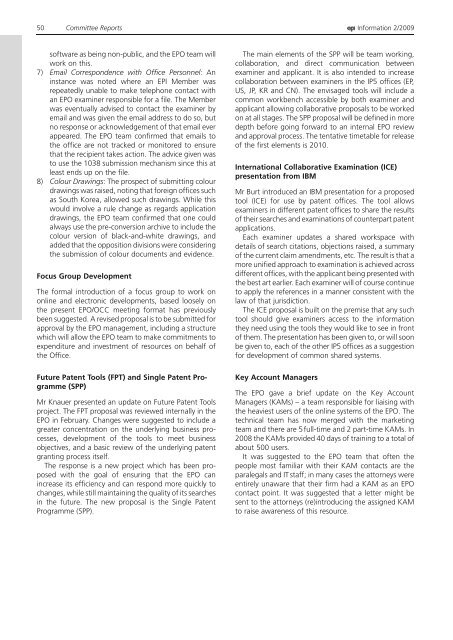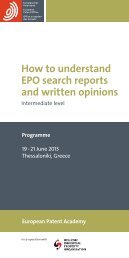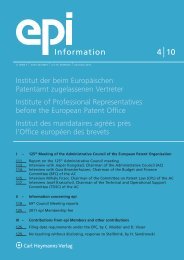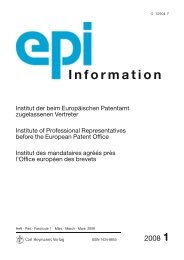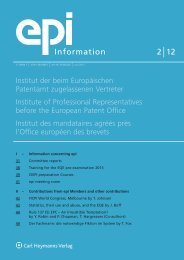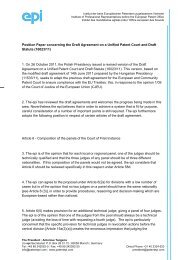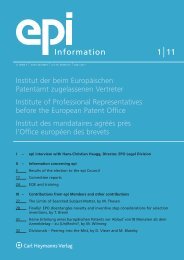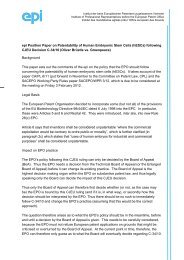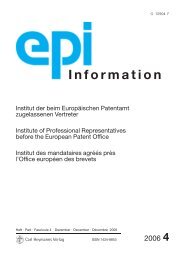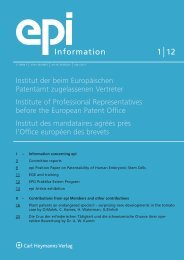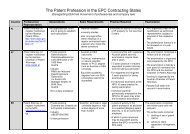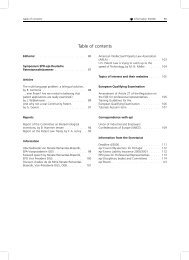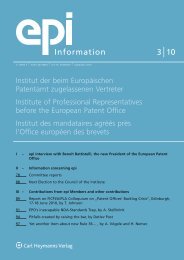epi Information 2/2009
epi Information 2/2009
epi Information 2/2009
You also want an ePaper? Increase the reach of your titles
YUMPU automatically turns print PDFs into web optimized ePapers that Google loves.
50 Committee Reports <strong>Information</strong> 2/<strong>2009</strong><br />
software as being non-public, and the EPO team will<br />
work on this.<br />
7) Email Correspondence with Office Personnel: An<br />
instance was noted where an EPI Member was<br />
repeatedly unable to make telephone contact with<br />
an EPO examiner responsible for a file. The Member<br />
was eventually advised to contact the examiner by<br />
email and was given the email address to do so, but<br />
no response or acknowledgement of that email ever<br />
appeared. The EPO team confirmed that emails to<br />
the office are not tracked or monitored to ensure<br />
that the recipient takes action. The advice given was<br />
to use the 1038 submission mechanism since this at<br />
least ends up on the file.<br />
8) Colour Drawings: The prospect of submitting colour<br />
drawings was raised, noting that foreign offices such<br />
as South Korea, allowed such drawings. While this<br />
would involve a rule change as regards application<br />
drawings, the EPO team confirmed that one could<br />
always use the pre-conversion archive to include the<br />
colour version of black-and-white drawings, and<br />
added that the opposition divisions were considering<br />
the submission of colour documents and evidence.<br />
Focus Group Development<br />
The formal introduction of a focus group to work on<br />
online and electronic developments, based loosely on<br />
the present EPO/OCC meeting format has previously<br />
been suggested. A revised proposal is to be submitted for<br />
approval by the EPO management, including a structure<br />
which will allow the EPO team to make commitments to<br />
expenditure and investment of resources on behalf of<br />
the Office.<br />
Future Patent Tools (FPT) and Single Patent Programme<br />
(SPP)<br />
Mr Knauer presented an update on Future Patent Tools<br />
project. The FPT proposal was reviewed internally in the<br />
EPO in February. Changes were suggested to include a<br />
greater concentration on the underlying business processes,<br />
development of the tools to meet business<br />
objectives, and a basic review of the underlying patent<br />
granting process itself.<br />
The response is a new project which has been proposed<br />
with the goal of ensuring that the EPO can<br />
increase its efficiency and can respond more quickly to<br />
changes, while still maintaining the quality of its searches<br />
in the future. The new proposal is the Single Patent<br />
Programme (SPP).<br />
The main elements of the SPP will be team working,<br />
collaboration, and direct communication between<br />
examiner and applicant. It is also intended to increase<br />
collaboration between examiners in the IP5 offices (EP,<br />
US, JP, KR and CN). The envisaged tools will include a<br />
common workbench accessible by both examiner and<br />
applicant allowing collaborative proposals to be worked<br />
on at all stages. The SPP proposal will be defined in more<br />
depth before going forward to an internal EPO review<br />
and approval process. The tentative timetable for release<br />
of the first elements is 2010.<br />
International Collaborative Examination (ICE)<br />
presentation from IBM<br />
Mr Burt introduced an IBM presentation for a proposed<br />
tool (ICE) for use by patent offices. The tool allows<br />
examiners in different patent offices to share the results<br />
of their searches and examinations of counterpart patent<br />
applications.<br />
Each examiner updates a shared workspace with<br />
details of search citations, objections raised, a summary<br />
of the current claim amendments, etc. The result is that a<br />
more unified approach to examination is achieved across<br />
different offices, with the applicant being presented with<br />
the best art earlier. Each examiner will of course continue<br />
to apply the references in a manner consistent with the<br />
law of that jurisdiction.<br />
The ICE proposal is built on the premise that any such<br />
tool should give examiners access to the information<br />
they need using the tools they would like to see in front<br />
of them. The presentation has been given to, or will soon<br />
be given to, each of the other IP5 offices as a suggestion<br />
for development of common shared systems.<br />
Key Account Managers<br />
The EPO gave a brief update on the Key Account<br />
Managers (KAMs) – a team responsible for liaising with<br />
the heaviest users of the online systems of the EPO. The<br />
technical team has now merged with the marketing<br />
team and there are 5full-time and 2 part-time KAMs. In<br />
2008 the KAMs provided 40 days of training to a total of<br />
about 500 users.<br />
It was suggested to the EPO team that often the<br />
people most familiar with their KAM contacts are the<br />
paralegals and IT staff; in many cases the attorneys were<br />
entirely unaware that their firm had a KAM as an EPO<br />
contact point. It was suggested that a letter might be<br />
sent to the attorneys (re)introducing the assigned KAM<br />
to raise awareness of this resource.


